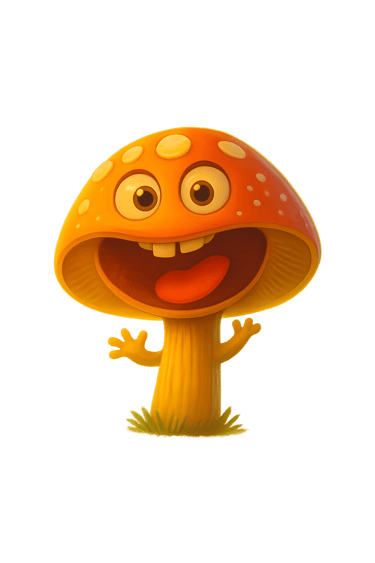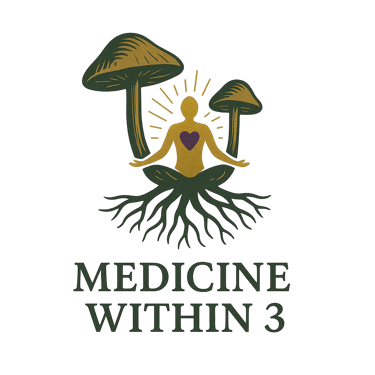feather
Exploring Magic Mushrooms for Depression Relief
Learn how psilocybin in magic mushrooms can help relieve depression by rewiring the brain, breaking rumination loops, and fostering long-term emotional change.
MW3
8/5/20257 min read


What Depression Does to the Brain
Depression isn’t just “feeling sad” for a while — it’s a deep shift in how your brain functions and communicates with itself. As Gabor Maté often says, depression is not a personal failure or weakness. It’s a natural — if painful — response to loss, stress, or disconnection that has taken root in the mind and body.
When the Brain Slows Down
In a healthy brain, information flows freely like water through a vibrant forest stream. Thoughts, emotions, and memories move in and out, giving you flexibility in how you feel and respond to the world. But in depression, that flow slows down — or even gets stuck — in a tangle of negative loops.
The prefrontal cortex, which helps with decision-making and perspective, can become less active. The amygdala, your brain’s emotional alarm center, may work overtime, making sadness, guilt, or fear more intense. Meanwhile, the hippocampus, which stores memories and regulates emotions, can shrink in size when stress hormones like cortisol stay high for too long. This can make it harder to see new possibilities or remember happier times.
Paul Stamets might compare this to a forest that’s stopped exchanging nutrients — some parts are overgrown, others are starving, and the whole ecosystem suffers.
The Default Mode Network and the Loop of Rumination
One of the key players in depression is the Default Mode Network (DMN) — the part of your brain that activates when you’re thinking about yourself, daydreaming, or reflecting on the past. It’s useful for self-awareness, but in depression, the DMN can become overactive, trapping you in cycles of rumination.
This is when you replay the same painful thoughts over and over, like a song stuck on repeat. The brain mistakes this for problem-solving, but it’s really just deepening the groove of hopelessness. Gabor Maté would say this is your mind’s attempt to make sense of pain — but without new input, it keeps circling the same old story.
How Depression Disrupts Neuroplasticity
Neuroplasticity — your brain’s ability to create new connections and adapt — is like the mycelium under a forest floor, constantly growing and linking different parts of the ecosystem. In depression, this flexibility shrinks. You become more likely to take the same mental and emotional “paths,” even if they’re leading nowhere good.
David Arora might point out that in a damaged forest, fungi still try to repair the soil, but it takes time and the right conditions. Similarly, the brain in depression can still grow and adapt — but it needs the right kind of nourishment and environment. Without it, the same limited pathways dominate, making it hard to feel motivated or hopeful.
Why You Can’t Just “Snap Out of It”
People who haven’t experienced depression sometimes suggest that you should “just think positive” or “pull yourself together.” But depression changes your brain chemistry and wiring in ways that make those things nearly impossible without support. It’s not a matter of willpower — it’s biology, chemistry, and lived experience all woven together.
The lowered activity in mood-regulating areas, reduced neuroplasticity, and overactive DMN combine to create a kind of mental gravity. This “gravity” pulls you toward inaction, withdrawal, and hopeless thinking, even when you desperately want to feel different.
Where Magic Mushrooms Come In
This is where psilocybin — the active compound in magic mushrooms — offers hope. Paul Stamets’ research suggests psilocybin can help reset the DMN, quieting the endless rumination and allowing new thought patterns to emerge. It also promotes neurogenesis and synaptogenesis, meaning your brain can grow new cells and forge fresh connections.
Instead of being stuck on one overused mental trail, psilocybin can open dozens of new ones — paths that might lead to joy, connection, or curiosity. Gabor Maté would say this gives you the chance to approach old wounds with compassion rather than fear.
And in David Arora’s forest metaphor, it’s like giving the soil the exact nutrients it needs for the ecosystem to come back to life. The brain begins to feel more balanced, more connected, and more capable of growth.
The Bottom Line
Depression changes your brain — but it doesn’t break it. Just like a forest after a long winter, the potential for growth is always there beneath the surface. Understanding what’s happening in your brain is the first step toward finding the right tools for recovery.
Magic mushrooms, when used with care, intention, and support, can help restore your brain’s natural flexibility and open up new possibilities for healing. They’re not a quick fix — but they can be a key part of creating the right conditions for your mind to flourish again.
Psilocybin’s Role in Neuroplasticity
Neuroplasticity is your brain’s superpower. It’s what allows you to learn a new skill, change a habit, or recover after injury. In depression, this flexibility is reduced, making it harder to shift out of negative patterns or adopt new ways of thinking. Psilocybin appears to help bring this flexibility back online.
How Psilocybin Sparks New Growth
Paul Stamets often compares psilocybin to a spring rain in a dried-up forest — it doesn’t just make the plants perk up, it soaks deep into the soil, waking up seeds you didn’t even know were there. In the brain, this “rain” comes in the form of increased neurogenesis (new brain cells) and synaptogenesis (new connections between neurons).
This burst of activity can help break the “mental ruts” caused by depression, opening the possibility of different emotional responses and perspectives. Instead of walking the same well-worn trail of hopelessness every morning, you might start noticing side paths that lead somewhere lighter.
The Default Mode Network Reset
One of psilocybin’s most studied effects is its ability to temporarily quiet the Default Mode Network (DMN), the part of your brain that fuels self-focused, repetitive thinking. In depression, the DMN can act like a bad narrator, repeating the same sad script over and over.
By softening the DMN’s hold, psilocybin allows other parts of the brain to communicate more freely. Think of it like turning down the volume on that one overly loud voice in a group, so you can finally hear the rest of the conversation.
Why This Matters for Depression
When your brain can form new connections and break old patterns, you gain a window of opportunity to try new habits, thoughts, and coping skills. This is why many experts emphasize the importance of integration — using the days and weeks after a psilocybin experience to reinforce healthier patterns through therapy, journaling, or mindfulness practices.
David Arora might say that while the rain is vital for new growth, the forest still needs sunlight, space, and care to truly thrive. Psilocybin may start the process, but consistent nurturing keeps it going.
Breaking the Cycle of Rumination
Rumination is like mental quicksand. The more you struggle with the same thoughts, the deeper you sink. In depression, rumination can feel like your brain is stuck replaying a highlight reel of every mistake, regret, or painful memory — except it’s more like a lowlight reel that never ends.
The Problem with the Loop
Gabor Maté explains that rumination is your mind’s way of trying to make sense of unresolved pain. The trouble is, without new insight, you’re just spinning in circles, reinforcing the same feelings of hopelessness and self-criticism. The Default Mode Network (DMN) is a big driver of this loop, constantly pulling you back to the same mental territory.
How Psilocybin Interrupts the Pattern
Psilocybin can act like a gentle hand pulling you out of the quicksand. By quieting the DMN and increasing communication between different brain regions, it helps you step outside the loop and see things from a fresh angle.
Paul Stamets might liken it to stumbling upon a hidden forest trail that takes you somewhere beautiful, away from the well-trodden path you’ve been pacing for years. For many, this can be the first real taste of relief from the mental noise in a long time.
Creating Space for New Perspectives
When the rumination loop pauses, even briefly, there’s space to plant new ideas. You might suddenly realize that the harsh inner voice you’ve been listening to isn’t the whole truth — or even your own voice at all. You might feel more able to imagine a different future, one where joy and connection are possible.
David Arora might say it’s like finding sunlight breaking through the forest canopy after weeks of cloud cover. It’s not the full summer yet, but it’s a sign that things can change.
Integration: Turning Insights into Lasting Change
A psilocybin experience can feel like someone has thrown open the windows of a stuffy room in your mind, letting in fresh air and light. But as refreshing as that moment is, the real transformation happens when you learn how to keep those windows open. That’s where integration comes in.
Why Integration Matters
Paul Stamets often points out that new neural pathways are like tender seedlings — they need care to grow strong. Without ongoing attention, your brain’s old habits can slowly take over again, pulling you back into the familiar grooves of depression. Integration helps you nurture these new connections so they can become the default routes your mind travels.
Practical Integration Tools
Gabor Maté emphasizes that emotional healing happens in connection and safety, so start by surrounding yourself with supportive people and environments. You might commit to regular therapy, join a support group, or work with an integration coach who understands psychedelic experiences.
Daily practices like journaling, mindfulness meditation, and creative expression can help you anchor the insights you gained during your journey. Even something as simple as taking mindful walks in nature — David Arora’s favorite classroom — can reinforce your sense of connection and calm.
Making It a Lifestyle Shift
Integration isn’t just about remembering your insights; it’s about acting on them. If your psilocybin journey showed you the importance of self-compassion, make choices that reflect that — whether it’s setting healthier boundaries, prioritizing rest, or saying yes to new opportunities. The more you align your daily actions with your new perspective, the more your brain reinforces these healthier pathways.
The Long View
Depression doesn’t disappear overnight, but with care and commitment, the shifts from a psilocybin experience can ripple into every part of your life. Just as mycelium quietly transforms a forest from the ground up, these changes can spread slowly, steadily, and powerfully — until one day you realize you’ve built an entirely new inner landscape.








Medicine Within 3
Experience transformation through healing and Mushroom
Connect
© 2025. All rights reserved.
